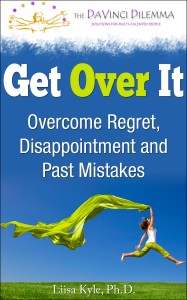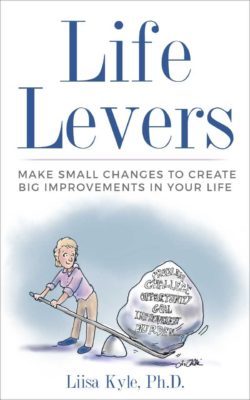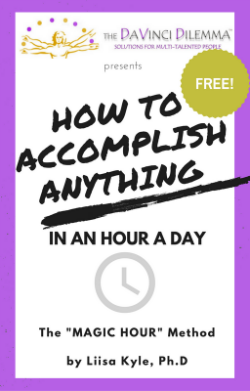
By Eviatar Bach [Public domain], from Wikimedia Commons
The most powerful words on the planet are the ones we use to describe ourselves. We might not even be aware of what those words are — or where they came from. As DaVincis — multi-talented people juggling many ideas and projects — we are likely to have internalized others’ complaints about our diverse activities. “Dilettante!” “Flake!” “Irresponsible!” “Unrealistic!” “Grandiose” “Dilly-dallier” are just a few of the brands we’re apt to have attracted.
One helpful task in Julia Cameron’s Vein of Gold is a two-part activity that addresses these negative labels we may harbor deep down. The first part of the assignment is to identify ten of the derrogatory labels we recall from childhood. You know — those hurtful things someone branded us when we were young — things like “dreamer” or “foolish” or “not focused”. Those spoken syllables that chided us when we were too naive to know that such descriptors were just that person’s opinion — and probably said more about that person’s issues and personality than it did about our own.
The second step Cameron prescribes is to convert these negative labels into something more positive, helpful…and probably more accurate. For example: “Dilettante converts to interested in many things. Dreamer converts to powerfully imaginative…. Eccentric converts to original.”
It takes courage to dredge up the complaints that people had about us when we were children. For example, my father used to call me “Lady of Leisure”. I don’t know why. I had a ton of extracurricular activities and part-time jobs and volunteered on top of it all. Yet every time he caught me daydreaming, he’d call out, in a teasing sing-song voice, “Hello, ‘Lady of Leisure’!” He probably meant it jokingly, but it stung every damn time he said it.
Or, I distinctly recall the afternoon when one elementary school chum, with whom I’m still pals, expressed her exasperation that I “start all these different projects and never finish any of them!” Now the truth is that I started many different projects and I finished many of them — and the cosmic Truth is that no-one HAS to finish EVERYTHING they start. In fact, the physical reality is that it’s absolutely impossible to do so.
It’s painful to reflect on those labels that stuck through adulthood — in my case, things like being called ‘intense’. I don’t enjoy being branded ‘intense’. It makes me wince. And yet, when I think of the people in my life I would describe as being ‘intense’, I don’t mean it as a complaint. For them, I think of ‘intense’ as a synonym for ‘passionate’ or ‘scary smart’ or ‘focused’.
Which leads nicely into the second part of the Cameron exercise: turning, in her words, “dross into gold”. Reframing the negative labels into something more helpful and positive.
This is a very gratifying — and beneficial — activity.
Okay, my dad implied I was ‘lazy’, but really, any downtime he witnessed was me “thinking” or “reflecting” or “imagining” or, in my own way, “trying to heal”.
My schoolchum thought I was a flake (and probably still does), but I’m perfectly content to be called “interested in many things.” It’s true! I am interested in many things! I’ll shout it proudly!
When I’m slammed for being ‘intense’ in the future, I’ll translate it internally as a complement that I’m passionate, smart and/or focused. I’m comfortable with any of those three descriptors.
And that’s the point: when we can re-label ourselves in a more positive light, we feel better about ourselves and whatever we’re doing. Our quirks become ‘features’. Our ‘secret shame’ becomes a ‘hidden strength’. THAT’s the power of words. We can wield words to heal ourselves.
Try it yourself: see how transformational it is to identify the negative labels you’ve internalized, to exorcise them and to transform them into more helpful, pleasant entities:
1. write down ten negative labels you recall from childhood.
2. convert these negative words into more helpful interpretations of your behavior.
Bonus activity: post your ‘golden words’ places you will see them.
What about you? What unhelpful labels have you been branded? What’s a different way of looking at them? What happens when you re-frame these negative words?
***
 For more, check out my book “GET OVER It: Overcome Regret, Disappointment and Past Mistakes”. Available here for only $3.99: http://bit.ly/GetOverItNow
For more, check out my book “GET OVER It: Overcome Regret, Disappointment and Past Mistakes”. Available here for only $3.99: http://bit.ly/GetOverItNow
***
Want to re-publish this article? Go for it – just include the author’s name, a link to this original post and the following text blurb:
Are you struggling with too many talents, skills, ideas? You may have The DaVinci Dilemma™! Find tools, fun quizzes, coaching, inspiration and solutions for multi-talented people at http://www.davincidilemma.com/ .



